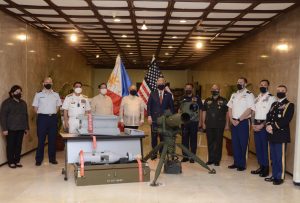U.S. National Security Adviser Robert O’Brien has wound up a two-nation trip to Southeast Asia, one intended to strengthen key relationships in the face of China’s growing power in the region.
O’Brien finished up the trip on November 23 in the Philippines, where he handed over a clutch of new weaponry designed to help the government combat Islamic State group-affiliated militants.
The $18 million donation was the result of the phone call between U.S. President Donald Trump and President Rodrigo Duterte in April, and included precision-guided munitions designed for use in counterterrorism operations.
“President Trump is standing with President Duterte as we combat ISIS here in Southeast Asia,” O’Brien said during the handover ceremony. “This transfer underscores our strong and enduring commitment to our critical alliance.”
O’Brien also reaffirmed Washington’s earlier pledge to defend the Philippines if it comes under attack in disputed areas of the South China Sea, where the country faces an increasingly robust Chinese naval and coast guard presence.
“They belong to the Philippine people,” O’Brien said of the resource of oil and gas that lie beneath the sea bed. “They don’t belong to some other country just because they may be bigger than the Philippines.” He added: “Our message is we’re going to be here, we’ve got your back, and we’re not leaving.”
Philippine Foreign Secretary Teodoro Locsin, Jr., responded by hailing the U.S. as “the best and undisputed military power in the world. The only one in history selflessly dedicated to the freedom and independence of other countries wherever threatened in the world.” Last month, the Philippines announced that it would resume oil and gas explorations in and around Reed Bank, which lies off the coast of Palawan island and is also claimed by China.
O’Brien also welcomed Duterte’s recent decision to extend the suspension of the abrogation of the Visiting Forces Agreement (VFA), which governs the deployment of U.S. personnel on Philippine soil. Duterte announced the cancellation of the agreement in February after the U.S. Congress moved to impose sanctions on top Philippine officials accused of human rights abuses.
In June, Duterte reversed his position and has twice granted a six-month stay to the abrogation of the VFA, due to fears over Chinese actions in the South China Sea, but has not ruled out following through on canceling the VFA in mid-2021.
The status of the VFA will be a pressing concern for the Biden administration once it takes office in January, and securing its extension will be a priority. As Richard Heydarian has noted, this will likely require Washington to “adopt some element of pragmatism” on questions of human rights. Indeed, this tension – between dueling U.S. concerns about rights abuses and the need to keep the alliance on an even keel – is likely to last until the end of Duterte’s term in mid-2022 – and possibly beyond, if one of his allies runs and is victorious at the next presidential election.
O’Brien’s visit to the Philippines came after a weekend stop in Vietnam, when he alternated similar pledges of support for Vietnam with denunciations of China’s assertiveness in the South China Sea.
He also addressed the U.S. Department of Commerce’s imposition earlier this month of preliminary anti-subsidy duties on Vietnamese light vehicle tires, due in part to the country’s “undervalued currency.” In an interview with Bloomberg News, O’Brien said that he told the government’s top leaders that cracking down on Chinese trans-shipments and easing Washington’s trade deficit with Hanoi “could be the basis for a reversal” of the tariffs.
The common denominator between the two visits was the need to reinforce U.S. relationships with the two Southeast Asian nations that have spoken out most strongly against China’s expansive claims in the South China Sea. More specifically, O’Brien’s tour was aimed at projecting a sense of diplomatic continuity during a fraught period of transition in Washington, which has seen President Trump mount a quixotic legal challenge to the results of the November 3 presidential election.
This context has made it all the more important to underline the U.S. commitment to a region where its engagement has often been perceived as episodic and sporadic. Both Manila and Hanoi will be watching in January to see if and how the Biden administration follows through.

































